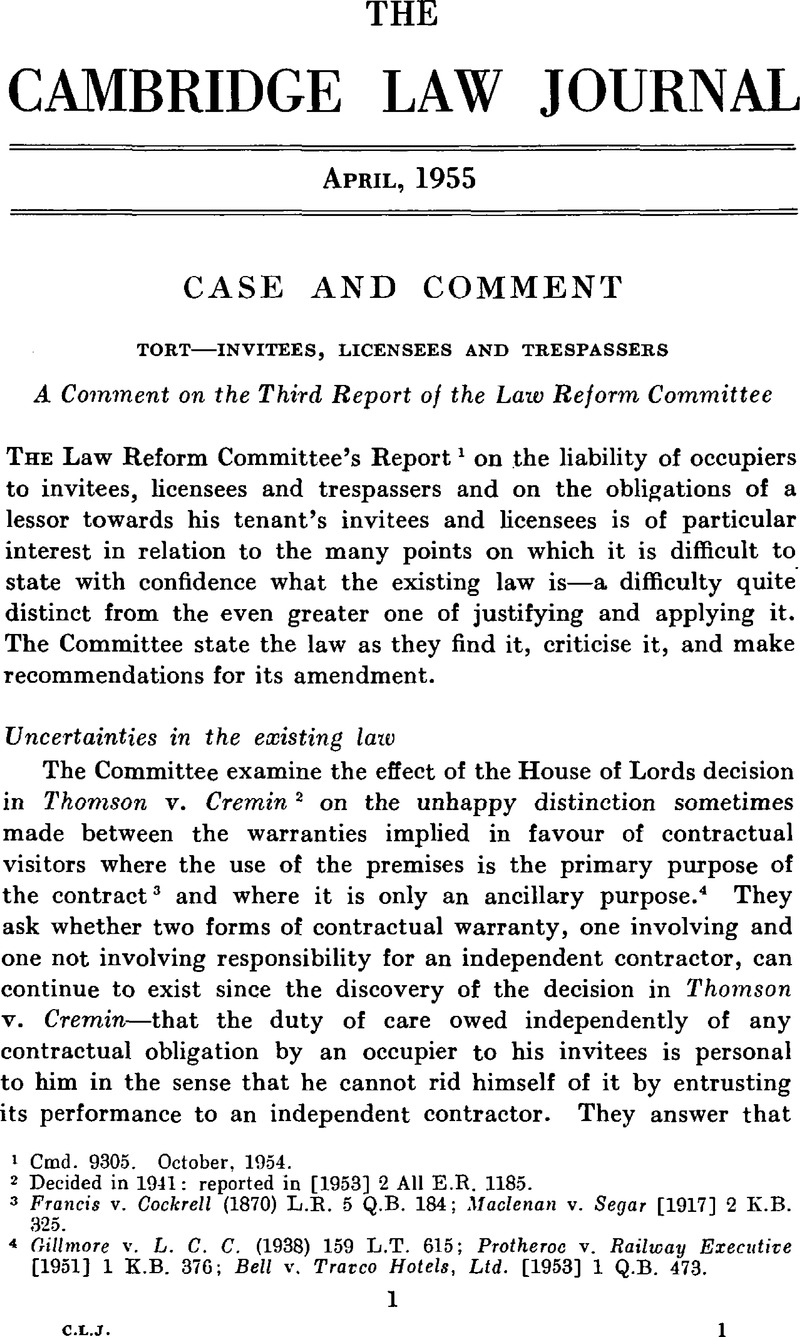No CrossRef data available.
A Comment on the Third Report of the haw Reform Committee
Published online by Cambridge University Press: 16 January 2009

1 Cmd. 9305. October, 1954.
2 Decided in 1941: reported in [1953] 2 All E.R. 1185.
3 Francis v. Cockrell (1870) L.R. 5 Q.B. 184; Maclenan v. Segar [1917] 2 K.B. 325.
4 Gillmore v. L. C. C. (1938) 159 L.T. 615; Protheroe v. Railway Executive [1951] 1 K.B. 376; Bell v. Travco Hotels, Ltd. [1953] 1 Q.B. 473.
5 See Fosbroke-Hobbes v. Airwork, Ltd. [1937] 1 All E.R. 108.
6 [1951] 2 K.B. 529; cf. Lockett v. Charles [1938] 4 All E.R. 170 on an implied condition in sale of goods.
7 [1941] 2 K.B. 343, at p. 352.
8 [1949] 2 All E.R. 191.
9 (1866) L.R. 1 C.P. 274.
10 [1951] A.C. 737.
11 But they think it possible that if a case involving comparable facts were to reach the House of Lords it might there be held that facts such as those in Haseldine v. Daw sufficed to warrant an exception to the general rule laid down in Thomson v. Cremin.
12 [1938] 1 K.B. 212.
13 [1950] 2 K.B. 353.
14 [1953] 1 W.L.R. 882; affirmed by Court of Appeal [1954] 1 Q.B. 319.
15 A distinction stressed by Denning L.J. in Dunster v. Abbott [1953] 2 Al. E.R. 1572, at p. 1574; [1954] 1 W.L.R. 58.
16 17 M.L.R. (1954) 102.
17 See Clerk and Lindsell, 11th ed., 1954, p. 691; Lord, Atkin in Hillen v. I. C. I. (Alkali), Ltd. [1936] A.C. 65, at p. 70;Google ScholarEdwards v. Railway Executive [1952] A.C. 737; contra Salmond, 11th ed., 1953, pp. 586–7.Google Scholar
18 Lowery v. Walker [1911] A.C. 10; Edwards v. Railway Executive (supra).
19 [1955] 1 All E.R. 129.
20 Fairman v. Perpetual Investment Building Society [1923] A.C. 74; Jacobs v. L. C. C. [1950] A.C. 361.
21 See Atkin, L.J. in Coleshill v. Manchester Corporation [1928] 1 K.B. 776, at p. 791.Google Scholar
22 But see Dunster v. Abbott [1953] 2 All E.R. 1572; [1954] 1 W.L.R. 58, in which a canvasser for advertisements was regarded as a licensee only.
23 [1954] K.B. 174.
24 Cavalier v. Pope [1906] A.C. 428; Ryall v. Kidwell [1913] 3 K.B. 123.
25 [1932] A.C. 562.
26 “Reasonable care to see that the premises are reasonably safe” is apparently deliberate wording.
27 Stated fully in para. 78 (iii) but paraphrased in para. 95A (2) (iii).